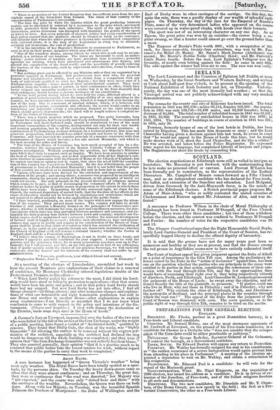SCOTLAND.
The election negotiations at Edinburgh seem still as veiled in intrigue as heretofore. Mr. Macaulay is put forward, with the understanding that he into make no personal effort or canvass. Lord Provost M‘Laren has been formally put in nomination, as the representative of the Radical Dissenters. Mr. Campbell of Monzie comes forward as a Free Church- man, and as an independent candidate who has declared for Free-trade the ballot, and extension of the franchise and education. Lord Melgund, driven from Greenock by the Anti-Maynooth furor, is in the minds of some of the Edinburgh electors. A Scotch provincial paper proposes Mr. Adam of Blair-Adam "who so nobly contested the united counties of Clackmannan and Kinross against Mr. Johnstone of Alva, and was de- feated."
A successor to Professor Wilson in the chair of Moral Philosophy at Edinburgh has been found in Professor M`Dougall, of the Free Church College. There were other three candidates • but two of them withdrew before the election, and the contest was confined to Professors M'Dougall and Ferrier: the number of votes for the respective candidates was 24 and 13.
The Glasgow Constitutional says that the Right Honourable David Boyle, lately Lord Justice-General and President of the Court of Session, has re- spectfully begged liberty to decline the offered dignity of baronetcy.
It is said that the grouse have not for many years past been so numerous and healthy as they are at present, and that the disease among the red grouse in Argyllshire seems now to have entirely exhausted itself.
The Court of highest appeal has given judgment against the Duke of Atholl on a point of importance in the Glen Tilt case. Among the preliminary de- fences raised by the Duke in the "action of declarator" against him, has been one on the question whether the parties who are principals in the cause were entitled to be parties in that action, considering the remoteness of their con- nexion with the road through Glen Tilt, and the few opportunities they would have of exercising their right over it, they being respectively citizens of Aberdeen, Perth, and Edinburgh. Lord Chancellor St. Leonards pronounced the judgment of the House of Lords : he swept away the objection, and af- firmed broadly the title of the plaintiffs to prosecute. "If parties could sue who live in Blair, why not those in Pitloehry ; and if in Pitlochry, why not further off? Why exclude the cities of Edinburgh, Perth, and Aberdeen— the metropolis of Scotland, and the principal places in the counties through which the road ran ?" The appeal of the Duke from the -judgment of the Court of Session was dismissed, with costs. The main question, as to the public right of way through Glen Tilt, remains to be tried on the merits,


























 Previous page
Previous page